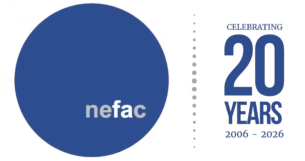NEFAC files and joins amicus briefs, letters and statements addressing important First Amendment issues. This is a listing of those documents, as well as others that may be of interest to you. While our main focus is on freedom of information concerns, we will consider supporting any effort that addresses the First Amendment.
If you would like to have NEFAC sign onto your brief, or to have us file one on behalf of your cause, please email our executive director for more information. Briefs, letters and statements from previous years can be viewed here:
2011 | 2012 | 2013 | 2014 | 2015 | 2016 | 2017 | 2018 | 2019 | 2020 | 2021 | 2022 | 2023 | 2024 | 2025
Support of Vt. H.572: Removing Restriction on Public Access to Online Criminal Records (Feb. 2026)
When access to court records is severely burdened, confidence in the judicial process is lost, as the press cannot timely report or must forego reporting altogether. This is the case in Vermont, where journalists must spend hours at the courthouse, battling bureaucracy and technology to use terminals that are limited in number and often out of service, seeking assistance from busy clerks to log in, print hard copies, or even take individual pictures of each page with their phones. For newsgatherers, timeliness of reporting is crucial, and this delay is often tantamount to an outright denial of access.
Bean Maine Lobster v. Monterey Bay Aquarium Foundation (1st Circ. 2026)
This libel suit raises serious concerns about the press’s ability to report news and analysis, including on complex policy topics, without the threat of crippling libel suits. The undersigned newsrooms and media organizations submit this brief — for some, their third amicus filing in this litigation — because the District Court’s analysis on two foundational issues of defamation law threatens to weaken key protections for journalists to do their jobs. The District Court also erred when it did not apply Maine’s former anti-SLAPP law to the challenged publication.
Opposition to Maine LD 1911: Automatically Sealing Criminal Records (Feb. 3, 2026)
I write on behalf of organizations interested in the free flow of government information in Maine to alert you to grave constitutional problems with LD 1911 – An Act to Automatically Seal Criminal History Record Information for Certain Crimes. LD 1911 would automatically seal a wide swath of judicial records regardless of circumstances and after an arbitrary period of time. These features of LD 1911 violate the First Amendment as applied to the States through the Fourteenth Amendment to the United States Constitution.
Opposition to N.H. SB 626: Limiting Public Records to State “Citizens” (Feb. 3, 2026)
SB626 is problematic because, if enacted, it would limit transparency with respect to certain public records, even when producing the records would not be unduly burdensome. Indeed, Part I, Article 8 of the New Hampshire Constitution does not limit right of access to “citizens,” but rather uses the phrase “the public” when it more broadly states that “the public’s right of access to governmental proceedings and records shall not be unreasonably restricted.” While we appreciate efforts of the sponsors to narrow the scope of the bill — which includes the addition of language incorporating as “citizens” non-domiciliaries who own property (and, thus, pay property taxes) and “any media as defined in RSA 91-A:4, IX” — this bill still narrows the scope of our Right-to-Know Law.
The New York Times v. U.S. Dept. of Defense (D.D.C. 2026)
The events of the past few weeks occurred with the Pentagon virtually empty of the press corps that has walked its halls since it opened during World War II. That is because, on October 15, 2025, nearly every journalist with a press badge was forced to hand it in and leave the building following the implementation of the Pentagon’s new policy challenged in this litigation. Many of these journalists had covered the policies and activities of the world’s largest armed force for decades, across numerous administrations; reported as embeds with U.S. troops in conflict zones; and spent years stationed in Iraq, Afghanistan, and other regions with a U.S. military presence. But they all lost their credentials because the Department of Defense now takes the view that posing questions to its personnel outside the confines of official briefings presents a potential security threat.
